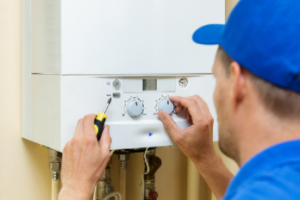There are many hot water options to choose from. You can choose your hot water tank size, hot water pressure, and even your desired hot water temperature! It’s a good idea to explore all of your options before you make a purchase. Adelaide Hot Water Systems take warm, room-temperature water from your well or borehole and re-heats it by passing it through a heat exchanger. This method can save you both money and energy. Here are some of the pros and cons of this type of heating system.

Electric Hot Water Systems. Electric water heaters use a heating component located inside a pre-heated tank to heat running water through a heat exchanger. The liquid is heated, stored and maintained inside the tank, ready to be utilized whenever you need it. Electric water heaters have reduced running costs than gas-fired heaters, producing less total energy than a standard water heater.
Tankless Hot Water Systems. Tankless hot water systems are becoming more popular with homeowners, as it does not use tank-mounted storage tanks for heat. Water is pumped into a small, sealed cylinder from the main tank, and heat is conducted through the solenoid valve when hot water is needed. As needed, the solenoid will switch on the heat and then off again, keeping the system as hot as it needs to be. Tankless Adelaide Hot Water Systems are available in both ground source and demand-based systems. Ground source systems deliver hot water directly to your home; demand-based systems are stored in an external reservoir, and they can be heated when necessary.
Gas Hot Water Systems. Gas hot water systems grow in popularity because they do not need to store any water when heating. Instead, propane, natural gas or other fuel is burned to create heat. A combustion engine kicks up the heat, which is then absorbed into the gas. This is one of the most efficient forms of water heating, but it’s also the most expensive.
Solar Hot Heater. Using solar power to heat your water is an excellent way to reduce your environmental footprint and save money. The sun’s rays can heat your water efficiently for hours, making solar hot water systems an excellent green solution. It is also environmentally friendly. Using solar hot water systems does not release any greenhouse gas emissions into the atmosphere.
Stand-alone Heaters. Stand-alone heaters are typically smaller versions of the solar option, using the same basic principle. These may be installed directly into a house, on a deck, or in a gazebo. They are sized according to the homeowner’s needs and come in various styles, from small, single-burner models to larger, more complex units with multiple burners.
Storage Hot Water Heaters. Heaters that store water heaters in a storage tank are an excellent green option for homeowners on a budget. There are many sizes and models available, depending on the homeowner’s needs. Homeowners may choose a small, single-burner heater for use in a bedroom; a larger, multi-burner storage water heater could be added to a utility room.
Electrical and Solar Energy Storage. Solar and electrical storage heaters can be installed directly into a home’s plumbing system. Or homeowners may choose to purchase and install a solar hot water system with a solar collector. Electrical and solar energy storage heaters are also available for use in a home’s existing plumbing system. Both types of units require approximately ten hours of sunlight each day to work at maximum capacity.